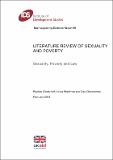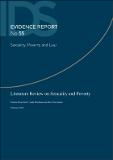| dc.description.abstract | This review of the evidence on sexuality and poverty is undertaken by the Institute of Development Studies (IDS) as part of a larger Accountable Grant from the UK Government’s Department for International Development (DFID).
DFID is increasingly interested in understanding issues around sexuality, poverty and human rights, and this interest is particularly focused around LGBT (lesbian, gay, bisexual, transgender) issues. Recently the Commonwealth Eminent Persons Group recommended, inter alia, appointing a human rights commissioner to address homosexuality alongside other human rights issues. In 2011, David Cameron suggested that UK aid might be withheld from those governments that retain anti-homosexuality legislation. He has argued that it is necessary for governments to adhere to ‘proper human rights’ reform if they wish to be recipients of UK aid (BBC 2011). The proposal for conditional aid was poorly received in some quarters. The Ghanaian, Ugandan and Malawian governments responded defiantly. They considered it an act of bullying and would rather forego the money than accept these conditions. Activists, journalists and policymakers argued that LGBT persons are not the only ones whose rights are violated. Singling these groups out might cause an anti-gay backlash. Conditionality is often based on outsiders’ assumptions about African sexualities. Some argued that actions to promote the rights of LGBT persons should be placed within a broader human rights perspective, recognise the role of African civil society groups and show an awareness of the historical fact that many of these discriminatory laws are actually a legacy of British colonial rule (AMSHeR 2011).
This review contributes to the larger Sexuality, Poverty and Law Theme of the Accountable Grant, which aims to produce evidence-based, practical options for activists and policymakers for strengthening legal protection of lesbian, gay, bisexual, transgender, intersexed, questioning people and for sexual rights more generally. This theme focuses on understanding the links between sexuality and poverty with the aim of improving economic policy and programming to support people marginalised because of their sexuality. | en_GB |



